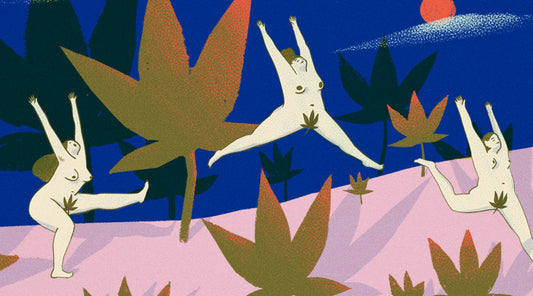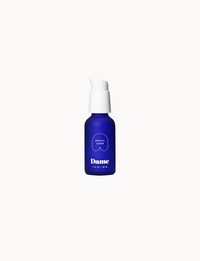You just had sex—maybe it was deeply intimate, emotionally charged, or a spontaneous afternoon quickie. And now? You’re crying. Not out of pain, not out of joy—just crying. Cue confusion, maybe even shame. “What is wrong with me?” you might wonder.
First of all: nothing. Absolutely nothing is wrong with you.
Crying after sex, also known as postcoital dysphoria (PCD), is more common than you think. And at Dame, we believe every part of your sexual experience—including the messy, tender, and complicated parts—deserves compassion, curiosity, and zero shame.
What Is Postcoital Dysphoria?
Postcoital dysphoria is a term used to describe feelings of tearfulness, sadness, irritability, or anxiety following consensual sexual activity. You might have enjoyed the sex. You might feel close to your partner. And still, the tears come.
Research published in the Journal of Sex & Marital Therapy found that around 46% of people with vulvas have experienced PCD at least once, and 5% experience it regularly. People with penises also report post-sex tears, though there’s less research on their experience—likely because it’s even more stigmatized.
Why Am I Crying After Sex?
There’s no single answer, and that’s kind of the point. Sex is never just physical. It’s mental, emotional, historical, hormonal, relational, and sometimes spiritual. When all of that collides, your body and brain might respond with... a good cry.
Here are some of the most common reasons behind those postcoital tears:
1. Hormones Are Powerful (and a Little Chaotic)
During sex, especially orgasm, your body releases a cocktail of hormones—oxytocin (the bonding chemical), dopamine (pleasure), and endorphins (pain relief and euphoria). Afterward, those hormone levels drop. Fast. Think of it like a chemical rollercoaster: the climb feels euphoric, but the drop can catch you off guard.
Your nervous system may also shift from high arousal (sympathetic mode) to rest (parasympathetic mode) very quickly, and that sudden shift can trigger an emotional release.
2. Sex Can Be an Emotional Portal
Even when it’s casual, sex can stir up emotions that live below the surface. Sometimes you’re accessing vulnerability or intimacy that you didn’t even realize you were craving—or resisting. Sometimes it brings up grief, memories, or unresolved feelings that you haven’t had time (or space) to process.
You may not know why you're crying. That’s okay. Your body is doing what it needs to do.
3. Old Wounds, New Triggers
If you’ve experienced sexual trauma, emotional neglect, or unhealthy relationships in the past, sex—even safe, consensual sex—can sometimes brush up against those wounds. You might feel triggered or unexpectedly vulnerable afterward. Crying in this context isn’t a sign of regression—it’s a signal. A message. Your body is asking for care.
4. Intimacy Overload
Let’s be real: being seen, touched, desired, and connected on that level can be a lot. Even when it’s wanted. Even when it’s good. Especially when you don’t experience that kind of intimacy often. For some people, the depth of connection can be overwhelming, leading to emotional overflow.
5. It’s Not Just the Sex, It’s Everything
Sometimes crying after sex has less to do with the sex itself, and more to do with what you’re carrying into the bedroom. Stress. Loneliness. Grief. Relationship tensions. In those moments of physical release, your body may let go of something you didn’t even realize you were holding on to.
Okay, But Is It Normal?
Yes. Completely. Postcoital tears are as valid as postcoital cuddles or snacks or naps. That said, frequent or distressing episodes might be a gentle nudge to check in with yourself or talk to a therapist—especially if the crying is accompanied by:
-
Feeling emotionally unsafe during or after sex
-
Disconnection from your partner or body
-
Feelings of shame or self-judgment
-
Flashbacks or physical discomfort
There’s no need to “fix” yourself—but there may be opportunities to better understand your body’s emotional landscape.
What Can You Do If It Happens?
Here’s the good news: you’re not at the mercy of your tears. You can develop tools, rituals, and conversations that help you hold space for this experience.
If It Happens to You:
-
Don’t fight it: Let the tears come without judgment. Crying is a natural release.
-
Ground yourself: Deep breaths, a warm blanket, or holding your chest can help bring your body back into regulation.
-
Journal later: Writing down what you were feeling (or not feeling) can help you make connections.
-
Talk to someone: Whether it’s your partner or a professional, you deserve support.
If It Happens to Your Partner:
-
Stay calm and present: Don’t rush to fix it. Just be with them.
-
Ask what they need: A hug? Silence? Tea? Honor their preferences.
-
Be mindful of assumptions: Their tears aren’t necessarily a reflection of you or your performance.
-
Check in later: Once emotions settle, create space for a follow-up conversation—if they want it.
What About Aftercare?
Aftercare isn’t just for kink or BDSM. Everyone benefits from intentional connection and support after sex. Some ideas:
-
Cuddle without expectation
-
Offer a warm towel or water bottle
-
Share a snack
-
Reflect or laugh together
-
Say something affirming like, “You’re safe with me.”
Building aftercare into your routine makes it easier to navigate the unexpected moments—like tears.
Bottom Line: Your Sexuality Is Valid in Every Form
Crying after sex is tender, human, and sometimes mysterious. It doesn’t mean you’re broken. It doesn’t mean your relationship is flawed. It simply means that your body, heart, and mind are doing the delicate dance of being alive, and being intimate.
At Dame, we’re here for all of that. The pleasure, the mess, the curiosity, and the tears. We’re not just here to make products—we’re here to support the full emotional spectrum of your sexual self.














































5 comments
Using the term vulva-havers reduces the beauty and mystique of womanhood to a sexual organ. Being a woman is so much more than just having a vuvla/vagina/uterus. Being a woman includes passion, charity, and sacrifice for the future of humanity and something much more than just a sexual organ and personal pleasure. What you sell is primarily for personal pleasure, which is great, but not at the expense of marketing campaign that minimizes the value of inherent femininity. There are plenty of other companies out there that sell the same products, arguably better, and without the marketing BS.
I appreciate the inclusive language as well. It’s important. Not everyone with a vulva is a woman and not everyone with a penis is a man. It hurts nobody to use language that is sensitive to that, and I say so as a cis woman, which is who “Bill Smith” seems to think he’s standing up for.
I appreciated this article. Emotions can get the best of us. Knowing that other people may have experienced this helps. And as a cis-gendered woman who is an Ally, I do appreciate the inclusive terminology.
Speaking of dysphoria, “people with vulvas and people with penises”? I love you guys and your products but please. You sell products almost exclusively made for WOMEN (who were born with vulvas). You should respect them enough to call them that – women. Your aim to be “inclusive” in your language minimizes and dismisses your actual customers and their pride of being women. It’s also not insulting to anyone to use that word. No one.
Thank you so much for this insightful, validating information!